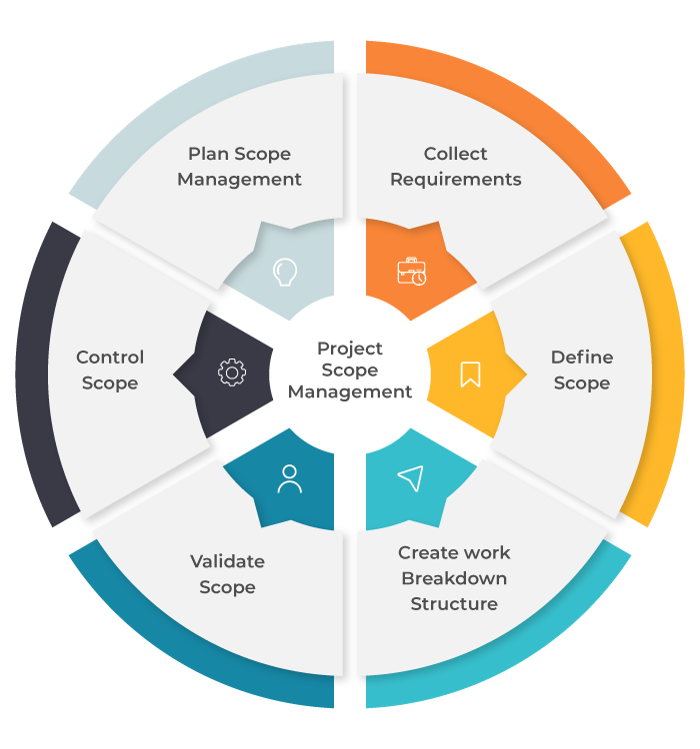
Project scope management in any project determines the efficiency and productivity by which the project will perform. By performing the best practices and processes for effective project scope management, a project manager can make sure that the deliverables are meeting the stakeholder’s requirements in tandem with the features and functions of the product, the scope of the project, etc.
What is Project Scope?
Project scope is the work that needs to be accomplished to deliver a product, service, or result with the specified features and functions. Scope refers to the detailed set of deliverables or elements of a project; these deliverables are derived from a project’s requirements.
What is Project Scope Management?
Project scope management is the process to ensure that a particular project includes all the work relevant/appropriate to achieve the project’s objectives. Its primary aim is to control what is and is not involved in the project. The scope management techniques enable project managers and supervisors to allocate just the right amount of work necessary to complete a project.
Project Scope Management consists of three processes namely:
- Planning: The process of getting an overview and defining the work that needs to be done to achieve the deliverables is called Planning.
- Controlling: The process of documenting, tracking, focusing on scope disruption, and also continually approving and disapproving the project changes through the controlling and monitoring process is called controlling.
- Closing: The process that includes an examination of the project deliverables and an assessment of the outcomes of the project against the original plan is the primary function of Closing.
As projects are taken up to deliver a product, it is highly impossible to achieve the desired objective of the project, if the project and product scope are not adequately explained. The two most widely used terms in Project Management are Project Scope and Product Scope.
- Product Scope: Product scope can be defined as the features or characteristics of a product regardless of the design, function, or parts, and the critical point is that product scope refers to the actual tangible product that is finally produced.
- Project Scope: In contrast to product scope, project scope focuses on the various steps taken to deliver a product. Project scope can include things like assembly lines, budgets, staff training, supply chains, and personnel allocations.

Why is Project Scope Management important?
The following reasons summarize the importance of Project Scope Management:
- The project scope outlines necessary concepts like the project scope, deliverables, and other project constraints – so inevitably project scope management becomes extremely important for any project.
- One of the most important outcomes of effective project scope management is that the deliverables match the stakeholder’s requirements. Therefore, it saves any shortcomings when it comes to project requirements.
- Any unprecedented changes in either the project budget, requirements, or deadlines, is easily dealt with by the processes involved in each of the project scope management process.
Project Scope Management Process
These six processes will be explained in detail in the upcoming articles under a specified topic. For now, here’s a brief on each of the processes:
Plan Scope Management
The scope management plan describes the project scope and documents how it will be further defined, validated, and controlled throughout the lifecycle of the project. The scope management plan includes the following:
- Project Scope Statement
- Project Requirements
- Project Deliverables
- Work breakdown schedule and change control process
Collect Requirements
It is the process of defining and documenting stakeholders’ needs to meet the project activities. The document for collecting requirements is developed in the project planning phase.
The “collect requirements” process includes the following:
- Business Requirements
- Stakeholder’s Requirements
- Project Requirements
- Quality Requirements
- Support and Training Requirements
The process basically helps in optimizing the project timeline according to the deliverables and utilizing the resources accordingly.
Define Scope
This is the process of developing a detailed description of the project and product. So while collecting the requirement list, all the different requirements of the project and the resulting product or service are defined.
The following are included while defining the scope:
- Project goals and objectives
- Tasks in the project
- Resources
- Budget and Schedule, etc
While defining the scope, we also corner a lot of activities and tasks that do not come under the scope of the project. This in turn helps in minimizing distractions and unnecessary expenses in terms of resources, budgets, etc.
Create Work Breakdown Structure
Creating a work breakdown structure is done using a technique called decomposition/breakdown. It is the process of subdividing project deliverables and project work into smaller and more manageable components for achieving a better outcome.
Creating the work breakdown structure includes the following:
- Project Management plans, documents, enterprise environmental factors, organizational structure, etc.
- Decision-making and breakdown of tasks for the project deliverables into smaller activities.
- Scope baseline and updates made to the project document.
Validate Scope
A part of the project monitoring and control process group in which process includes reviewing deliverables with the customer or sponsor to ensure that they are completed satisfactorily and obtaining formal acceptance of deliverables by the customer or sponsor.
The following are included while validating the scope:
- Completion of project deliverables
- Acceptance of project deliverables
- If the requirements are being met for the project deliverables.
Control Scope
Control scope is the last process group in project scope management. It is again a part of the project monitoring and control process group. Control scope is the process of monitoring the status of the project and product scope and managing changes to the scope baseline.
How Vital is Scope Management for Project Managers?
- Communication is considered the primary tool to adequately define the importance of scope management, to both the stakeholders and team members. This process takes place to ensure and agree on how the project goals will be met.
- The important features of scope management are that it helps in avoiding the challenges that a project might face when provided with increasing scope and a never-ending requirement list. As the project is executed, the project scope filters out the essential and feasible aspects of the project and controls all the aspects mentioned in the project scope. Additionally, scope management establishes a control mechanism to address factors that may result in changes during the project lifecycle.
- It is highly impossible to estimate the time and cost required for the project without adequately defining the project scope. Due to a lack of communication, the project scope can change drastically, which will, in turn, affect the cost and cause variations in the schedule of the project, causing losses.
| Looking forward to enhancing your Project Management skills? Enroll in PMP Training Program now, and take your career to the new heights |
Conclusion
The implementation of scope management in a project is considered essential and is never a difficult task; however, it requires effort, time, and patience. Only with the help of scope management, a project manager can define, control and ensure that the project deliverables are met, without any issues/risks occurring during the project lifecycle and that the stakeholders are satisfied with the investments that they have made. Learn about more such eventful skills and practices with PMP certification training, and master all the knowledge areas in Project Management.
Know more about Project Management best practices through Invensis Learning’s Project Management certification training on PMP Certification Online Training, PMI CAPM Certification, Prince2 Training Course, Project Management Fundamentals, etc.

















